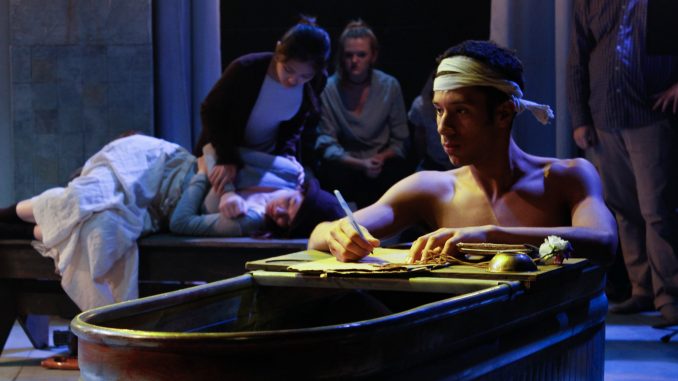
As José Mangual paced around Mitten Hall’s Temple Opera Theater, he pretended to seize an invisible head and snap it towards him. The imagined head was that of his character’s rival, Marquis de Sade.
“There are times when [Sade] is challenging me or pitting others against me, that I want to just take his head, and sometimes it’s just a sharp turn like, ‘Look at me!’ but other times I want to complete the motion and snap his neck,” Mangual said.
Mangual, a sophomore musical theater major, plays the role of Jean-Paul Marat in Temple Theater’s production of “Marat/Sade.” The play will open Wednesday and run until Nov. 19.
“Marat/Sade,” structured as a play within a play, is set in an insane asylum in 1808. The characters are patients who stage a play about the 1793 assassination of French Revolutionary Jean-Paul Marat.
Guillermo Alonso, a master’s acting student and theater professor, plays Marquis de Sade, the namesake of sadism. Sade is the director of the play and a historical figure imprisoned for publishing pornographic writing.
Alonso studied theater as an undergraduate at the University of Notre Dame while he completed pre-med coursework.
Although Alonso still views organic chemistry as his favorite college class, he said he decided in his junior year to commit to a career in theater.
“I realized that if I really wanted to be great at one or the other, I had to pick one and stick to it and devote all my time to that,” Alonso said.
For Alonso, studying theater represented a break from the rigidity of his science education.
“Now let’s be real, you gotta get good grades, you apply to [medical] school, you get into school, you apply to a residency program,” he said. “It’s a series of steps that you follow and that’s it, and I lived my life that way forever.”
“[Acting] kind of put my life back in my own hands,” he added. “As opposed to just following the rules, I can create my own path.”
Despite opting out of a career in medicine, Alonso said his scientific background influences his approach to understanding the reasoning for a character’s actions and language.
Alonso added that he has an “analytic sense” when it comes to theater.
“Give me a Shakespeare play and I can break it down better than a lot of actors and I haven’t read that much Shakespeare,” Alonso said. “I know how to simplify things because that’s what I had to do. Chemical reactions — you have to find the simplest reaction and then evolve it into something bigger.”
“Marat/Sade” also evokes the past experiences of director Donna Snow, head of undergraduate acting for the School of Theater, Film and Media Arts, and scenic designer Fred Duer, chair of the theater department. As college students in the late 1960s and early 1970s, both worked on productions of the play — Duer as a set designer, and Snow as Charlotte Corday, Marat’s assassin. At the time, the play’s focus on revolution and class conflict resonated with the movement against the Vietnam War, Snow said.
“We [staged the play] right around when the students were killed at Kent State,” Snow said. “I was very active in the anti-war movement, so it had a lot of meaning to me at that time.”
Snow said she was prompted to stage the play now because of the United States’ ongoing involvement in the Middle East.
“All these wars have been going on since 2001,” she said. “This is 15 years later. It really does take young people wanting to stop them because they’re the people that aren’t paying the mortgages, that don’t have the kids. That’s where all those movements start.”
Alonso said he sees the themes of “Marat/Sade” strongly reflected in national political divisions.
“This play deals with revolution and people in power who shouldn’t be in power, the injustices of being middle to lower class, and I would say that’s exactly where the country is today,” Alonso said.
“It’s going to resonate strongly with audiences,” he added. “Whether they make the direct correlation or not, it’s gonna ring a bell deep down inside.”
Ian Walker can be reached at ian.walker@temple.edu or on Twitter @ian_walker12.
Editor’s Note: An advertisement from the subject of this article is in the paper and online this week. An agreement to run the advertisement was reached separately from the editorial decision to write this article.


Be the first to comment